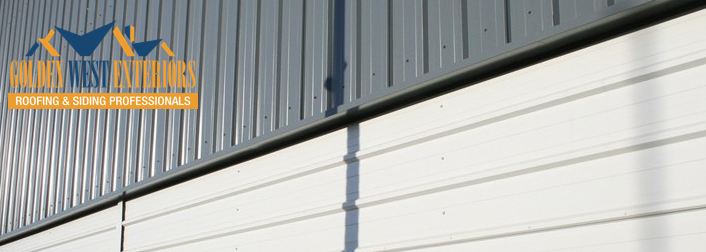
Commercial Cladding & Hardie Plank Installation
 Golden West Exteriors specializes in commercial cladding and Hardie Plank installation for Edmonton and the surrounding area. Cladding is the application of one material over another to provide skin or layer intended to control the infiltration of weather elements, or for aesthetic purposes. We have worked with clients, architects, manufacturers and suppliers to ensure our exterior siding products are delivered and installed in a timely and professional manner.
Golden West Exteriors specializes in commercial cladding and Hardie Plank installation for Edmonton and the surrounding area. Cladding is the application of one material over another to provide skin or layer intended to control the infiltration of weather elements, or for aesthetic purposes. We have worked with clients, architects, manufacturers and suppliers to ensure our exterior siding products are delivered and installed in a timely and professional manner.
We supply and install a complete range of cladding and exterior siding products for commercial, industrial and residential buildings.
James Hardie® Cement Lap Siding and Panels
Serving Edmonton and area, our Hardie Plank installation provides a modern contemporary appeal while giving a building exterior superior fire resistance.
The system comes complete with trim boards for around windows and openings that are available in a number of sizes. These systems also have the option of using extruded aluminum trims and reveals to create an even more modern architectural appearance. The siding, trims and reveals are available in a number of standard colours. Call us today to book your Hardie Plank installation.
Corrugated Metal Panels
Corrugated siding is an outer building cover made up of corrugated or ridged sheets of metal, fiberglass or vinyl attached in either horizontal or vertical patterns. Siding is called corrugated when it has been pressed or produced in the factory in a hill-and-valley pattern, with a half-inch (1.27 cm) depth to each valley. The most common corrugated siding is made of galvanized steel. The corrugations provide strength to the sheets of material, and allow them to be fastened to a framework with studs or cross members set much further apart than normal non-corrugated material. The corrugations in corrugated siding give flat material the rigidity required to withstand denting and bulging.
Aluminum Composite Panels
A composite panel is a type of building material used in place of traditional wood or steel. These panels are much more lightweight than solid wood or steel, but offer similar levels of strength and structural support. There are three basic types of composite panels, including engineered wood, aluminum, or fiberglass units. Each of these panels may consist of multiple layers of the same material or a lightweight core sandwiched between sheets of some type of protective material.
Insulated Wall Panels
An insulated metal panel (IMP) is composed of an insulated core material in place between two metal pre-coated skins utilizing an interlocking joint for a weather-tight system with a high R-value and superior airtightness. IMPs have the highest insulating value per inch of all wall-insulating products. As a result, they can significantly lower a building’s energy costs and overall operating costs. Insulated metal panels are also quick and easy to install. For example, while tilt-up, precast or block often require cranes and other equipment to be set in place, lightweight IMPs can often be installed with forklifts or a simple pulley system, lowering construction costs for the owner. They can be installed vertically or horizontally, and come in a variety of standard colours and finishes, from flat to striated and planked.